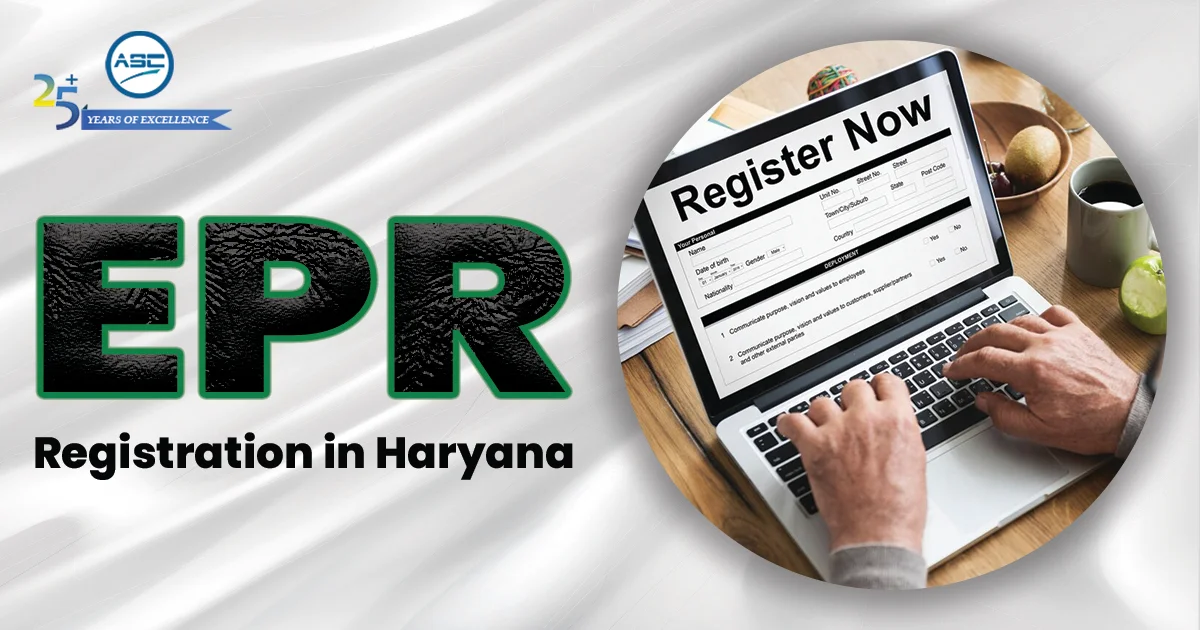EPR Registration in Haryana

Extended producer responsibility (EPR) is a government initiative that aims to shift the responsibility of waste management to manufacturers of goods from local governments and taxpayers. CPCB has introduced several rules, such as the Plastic Waste Management Rules, 2016; the E-waste (Management) Rules, 2016; and Battery Waste Management Rules, 2022, to control the environmental pollution due to this product waste.
EPR Registration in Haryana has been made obligatory for producers, brand owners, importers, and bulk consumers of plastic products, electronic products, and battery and their associated waste. ASC Group is a certified EPR consultant and a PRO (Producer Responsibility Organization) assisting companies in fulfilling EPR compliance and Recycling target.
Applicability of EPR Registration in Haryana for Waste Management
|
Electronic Waste |
Plastic Waste |
Battery Waste |
|
|
Producer |
Yes |
Yes |
Yes |
|
Importer |
Yes |
Yes |
Yes |
|
Brand Owner |
Yes |
Yes |
Yes |
|
Bulk Consumer |
Yes |
No |
No |
Essential Points to Consider For EPR Certificate in Haryana
- EPR registration in Gurugram is mandatory for producers, importers, bulk consumers, and brand owners of specified products listed in the rules for electronic goods, batteries, and plastic packaging, and tires.
- The EPR Certificate in Gurgaon is regulated by the State Pollution Control Board (SPCB) and the Central Pollution Control Committee (CPCC) of the government of India.
- The EPR registration is valid for 5 years. However, it needs to be renewed before the expiry of the registration period.
- Producers need to submit an annual report on the collection and disposal of their products,
- Producers also need to fulfill recycling and collection defined by CPCB.
- Non-compliance with the EPR compliance can lead to hefty penalties and legal action EPR Regulations.
How ASC Group Will Help You in Providing EPR Registration in Gurugram?
ASC Group has been listed as a certified PRO (Producer Responsibility Organization) by the government of India to assist the company in the complete EPR registration process. We help producers or importer to comply with the relevant EPR regulations and guidelines issued by the Central Pollution Control Board (CPCB). Now we provide our services in Gurugram, Karnal, Faridabad, Panipat, Rohtak, Hisar, Panchkula, Ambala, Sonipat, and all cities of Haryana. The team of EPR experts at ASC Group helps 1000+ companies in obtaining EPR Registration and other related services.
Some of the ways in which an ASC Group can assist companies are:
- Guide producers on procedures and other mandatory compliance for EPR Certificate in Gurugram.
- Assists in application forms, documentation process, annual return filing, and other compliance requirements related to EPR.
- Fulfilling collecting targets and recycling targets for the manufacturers
- Arranging the Logistics from collection targets, managing recycling channels, setting up of collection centers, implementing take back, reverse logistics facility, etc.
- Ensure to comply with their EPR regulation and minimize the environmental impact of the waste produced by their products.
- Assist in obtaining an EPR Registration in Haryana and another related advisory.
